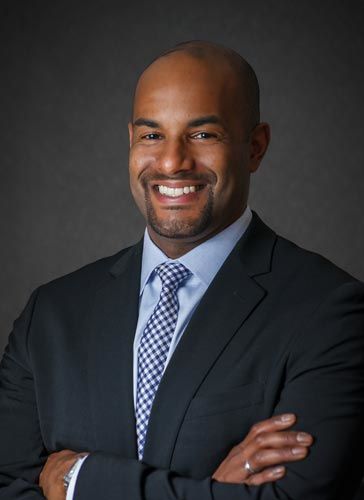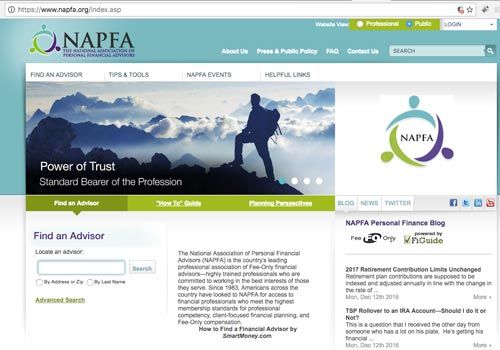NAPFA Could Help You Find a Financial Advisor Who Has Your Interests at Heart

Financial advisors can earn money in several ways. Some charge clients an hourly, monthly or annual fee. Others charge a fee based on how much money they manage for you. And some advisors get commissions for the mutual funds, stocks, and other financial products they get people to invest in or buy.
You might get great financial advice from an advisor regardless of how he or she makes money. However, some people are wary of working with an advisor who earns commissions because it could influence his or her recommendations. Instead, they choose to work with fee-only financial advisors who don’t have that potential conflict of interest.
Fee-only is different than fee-based, which means the advisor could earn commissions and charge clients fees.
The National Association of Personal Financial Advisors (NAPFA) is a professional association for fee-only advisors. We spoke with Geoffrey Brown, Chief Executive Officer, about the association’s history, what its members offer, and what people should look for in a financial advisor.
Louis DeNicola: What is NAPFA? When and why was it created?
Geof Brown: Association founded in 1983 by a group of financial advisors who felt there was a better way to serve their clients. Today, NAPFA is the leading association for fee-only financial advisors and all of our members practice comprehensive financial planning.

How does fee-only differ from other compensation arrangements for financial advisors?
The fee-only model facilitates an independent and objective client relationship because advisors are only paid by the client. For the consumer, this means you can sit down with a fee-only advisor and know they’re only beholden to you.
There are a few models out there. The most typical is when an advisor works for a large financial company and they get a commission on the financial products they offer to clients.
What that says to me is, “who is the advisor really working for in that relationship?” Are they working for the client? Or, is there objectivity influenced by their compensation for recommending product A versus Product B?
NAPFA members must take a fiduciary oath, why is that important?
(Note: the fiduciary oath is a promise to act in the best interest of clients, disclose potential conflicts of interest and not take payment for referring particular financial products.)
In our mind, the fiduciary oath very important. The oath represents a bold statement to clients and for us it’s really a differentiator. Even if you don’t work with a NAPFA-recommended advisor, you should take a copy of the fiduciary oath and ask the advisor to sign it. If they can’t, then they might not be able to act in your best interest.
Can you briefly explain the Department of Labor’s (DOL) new fiduciary rules? Do you view the change as a win for individual investors?
The DOL rule requires advisors act in the best interest of clients when offering guidance on 401(k) plan investments, avoid misleading statements, disclose potential conflicts of interest, show underlying fees, and make sure their compensation is reasonable. The rules updated a 40-year-old regulation (ERISA) and offers improved protections for consumers who’re saving for retirement. It aligns philosophically with NAPFA’s fiduciary oath.
So much has changed in how we save for retirement. While many people used to receive pensions, now they use 401(k)s and IRAs. Consumers are now able to get advice under a fiduciary obligation and I think it’s a strong step in the right direction for consumers.

How does NAPFA differ from some other financial advisor associations, such as XY Planning Network (XYPN)?
I look at NAPFA as the big tent because it’s the leading association for fee-only advisors. Fee-only advisors who belong to another network can also be a member of NAPFA, and some other networks require that. We usually share a fee-only focus, a focus on comprehensive financial planning, but they have a smaller focus under our tent.
XYPN is committed to working with Gen-X and Gen-Y clients and leveraging technology. Alliance of Comprehensive Planners is made up of fee-only advisors who do comprehensive planning and have a tax focus. Garrett Planning network focuses on delivering advice under an hourly-compensation model.
I see NAPFA as the big tent and there are different families (networks) for different segments of the market.
When should someone work with a financial advisor?
It’s never too early to think about working with a financial advisor. When you get your first job after college you may want advice around student loan debt, guidance around benefits you didn’t have before, or have questions about how to use your new income. Start early and really set yourself up for success.
Typically, you’re going to focus on investments when you meet with an advisor. However, NAPFA advisors practice comprehensive financial planning. Under a comprehensive model, you’ll have the opportunity to look at a lot of different aspects that play into reaching your goals. How you’re planning for retirement, saving for education, estate planning, things like that.
What type of fee can someone expect to pay?
I’ve seen hourly fees as low as $150, and retainer fees as low as $1,000. Some advisors will work on a project-basis, if you need help working on a budget for instance. Some have a monthly membership. It really depends on the needs and complexity of the client situation.
Is there a way for an individual to see a list of local NAPFA-registered advisors?
You can find a group of NAPFA-registered advisors by visiting our website. You can search based on geography, or by a particular practice focus. Perhaps an advisor who has experience working with small business owners, or with medical professionals, or works with LGBT families, you can find that within our search functionality.
You should have a lot of comfort because you know you’re searching among a group that’s fee-only, has been vetted, makes a fiduciary commitment annually, and is held to a strict code ethics.

What does an advisor need to do to become a NAPFA-registered advisor?
They apply for membership. We check that they have a form ADV, disclosure information that the advisor files with the SEC and state. We also verify that they do comprehensive planning by requiring them to submit a comprehensive plan or undergo a peer review.
There are four requirements for gaining and keeping membership. The advisor must:
- Be fee only
- Commit to upholding our fiduciary oath
- Commit to upholding our code of ethics
- Attain Certified Financial Planner (CFP®) designation
How can someone file a complaint if they believe their NAPFA-member advisor isn’t complying with the ethics code?
We encourage consumers to let us know if they feel something is amiss with their advisor. Reach out to us and share that information. Also, reach out and contact the other associations or organizations that the advisor is a part of, such as the CFP®. Maybe eventually reach out to the SEC.
We do investigate complaints to determine the facts surrounding the issue. Based on what’s uncovered we can refer the case to our internal ethics committee or we can work with the advisor and the client.
If something gets referred to another body, such as the CFP® or SEC, and an action is taken, we’ll definitely take action. In the three-plus years I’ve been with NAPFA, we’ve only had one instance of a consumer complaint that led to something substantive.
Leave a comment
CREDIT SCORE UPDATES
exclusive members-only deals






